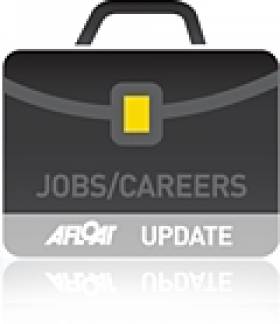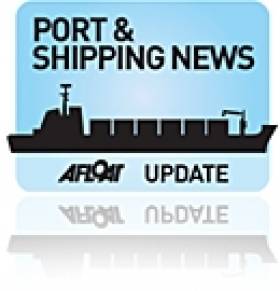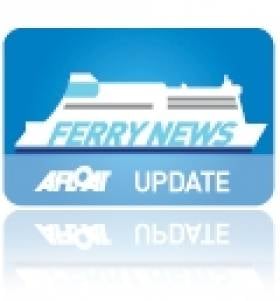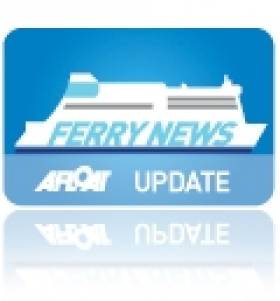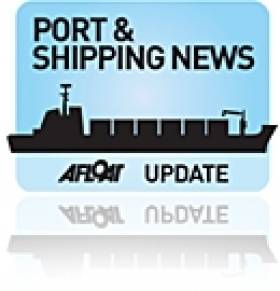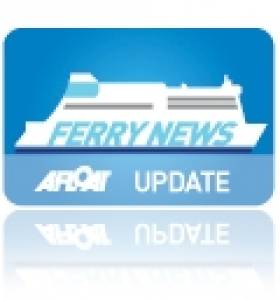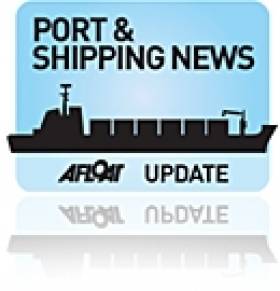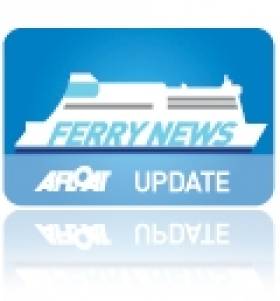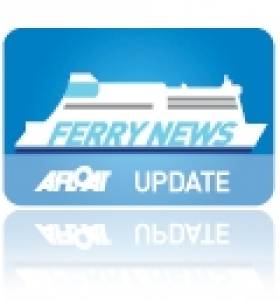Displaying items by tag: Ports and Shipping News
Gardline Order Third Newbuild from Arklow Boatbuilders
#NEWBUILD – Gardline Marine UK returned to Arklow Marine Services, having placed an order for a third windfarm service vessel, though on this occasion to a totally new design, writes Jehan Ashmore.
The 19m newbuild is to be constructed with a flexibly mounted deckhouse and wheelhouse in order to reduce noise absorbtion. Work will commence in early January and delivery date is July 2013.
Last June, the boatyard launched Guardian 10 on the River Avoca, this second 20m wind farm transfer service vessel was commissioned for Gardline and Alicat.
As previously reported on Afloat.ie she made her delivery promotional voyage the following month via the North Channel to her homeport of Great Yarmouth.
Currently at the yard is the Geological Survey of Ireland's RV Keary, which is undergoing modifications. She was recently lifted onto the quayside and where work is due to be completed with the vessel scheduled for re-launching early in the New Year.
Dutch Shipping Company Seek Professionals and Trainees
#CAREERS AT SEA - The two multi-purpose heavy cargoships that last month discharged windmill components in Dublin Port, are owned by Dutch based Abis Shipping who are currently offering traineeship opportunities, writes Jehan Ashmore.
The pair had met together in the port the same morning, where the newer and larger D-class Abis Dover arrived first followed by the smaller B-class Abis Belfast. As previously reported, they belong to a 14-strong fleet managed in Harlingen, where a local shipyard is to complete newbuild Abis Dublin with a delivery scheduled for this month.
With an expanding fleet of newbuilds, the progressive company which only formed in 2007 is seeking to grow with professionals in training or to those just finished studying. They, regularly have traineeship vacancies run through a nautical support department so to meet demands of charterers. Vacancies currently available are for Captain (D.P.O.), Chief Engineer and Chief Officers (D.P.O.). For further details visit this LINK.
Sinbad Marine's Coastal Cat Up for Sale
#CAT FOR SALE- Killybegs based Sinbad Marine Services have put up for sale the 12m SMS Coastal Cat, a 2010 built specialized survey and workboat completed at the local yard of Mooney Boats.
The 4-tonnes bollard pull vessel has a 25m sq. deck working area where there is a load capacity of 2 tonnes per sq. m. She is powered by Twin Perkins Sabre M215C engines delivering 430bhp coupled to Twin Disc 5061 gearboxes.
As previously reported on Afloat.ie, the Dublin Port Company's Voith Schneider tug Deilginis was acquired earlier this year by the Donegal integrated marine services company.
Among her new roles are 'Guard Vessel' duties and since her introduction after an upgrade, she has served in offshore waters at the Corrib Gas Field.
Irish Ferries Voted Best Ferry Company 2012
#FERRY AWARD – For the sixth year in succession Irish Ferries has won Best Ferry Company at the Irish Travel Trades News travel awards ceremony held in Dublin recently.
It is also the 15th occasion in the last 18 years on which the award has been presented to Irish Ferries. The award was presented to Irish Ferries on foot of votes cast by travel agents and their staff employed in offices across Ireland, north and south.
Accepting the award at a ceremony held in Dublin recently, Irish Ferries head of passenger sales Dermot Merrigan thanked travel agents for their recognition, adding that the award "reflects the high level of service which we strive to provide for our passengers."
Dublin-Douglas December Winter Sailings
#MANX FERRY- In preparation for the busy festive season, the Isle of Man Steam Packet Co. (IOMSPCo) are to deploy Ben-My-Chree to operate two round-trip Douglas-Dublin Port crossings, writes Jehan Ashmore.
The ro-pax (90-freight trailer/630 passenger) ferry is scheduled to depart Douglas on Saturday 22 December at 19.30hrs with an arrival in Dublin Port at 00.15hrs on the morning of Sunday 23 December. The return sailing departs the Irish capital at 01.00hrs.
On the following weekend, Ben-My-Chree heads for the 4 hour 45 minute Irish route again on Saturday 29 December, departing Douglas at 19.30hrs and arriving in Dublin just after mid-night at 00.15hrs. The return crossing on Sunday 30 December to the Manx capital departs 01.00hrs.
For updates on sailing schedules to include Manx-UK routes between Douglas-Heysham and the winter only operated Douglas-Liverpool (Birkenhead) route visit: www.steam-packet.com/en/LatestSailings
Ports & Shipping Review: Ferry Disruption, Remembering Seafarers, Naval Service First, Shipping Awards and Newbuild Abis Dublin
#PORTS & SHIPPING REVIEW - Over the last fortnight Jehan Ashmore has reported from the shipping scene where Celtic Link Ferries sailings between Rosslare and Cherbourg resumed operating, following mooring issues encountered in Cherbourg.
Memorial services were held in Dublin and Cork for the National Commemoration Services for Irish Seafarers. In addition to church services held, wreaths were laid in the capital at the memorial to Irish Seafarers at City Quay.
The Naval Service Base on Haulbowline, was the setting for an historic occasion as three women were promoted to the rank of Petty Officer.
Retaining to a naval theme, in Belfast, where WWI cruiser HMS Caroline is berthed, veterans and relatives of those who served on board are being invited to contribute memories to a project carried out by National Museum of the Royal Navy (NRMN).
In the latest analysis released from the Irish Maritime Development Office (IMDO) the volume of port and shipping traffic remained relatively stable in the third quarter of 2012, in which a breakdown of the five main shipping sectors is outlined.
Carl-Johan Hagman has been appointed new CEO of Stena Line, the 46-year old replaces Gunnar Blomdahl, who has served in this role for more than a decade of the Swedish owned ferry giant which celebrates its 50th anniversary this year.
The IMDO sponsored the Short Sea Shipping Company of the Year 2012 which went to Stena Line in Rosslare, at the annual Irish Exporters Association's Export Industry Awards. In the category for Deep Sea Shipping Company, sponsored by the Port of Cork Company the award went to Hapag-Lloyd while in the Seafood Exporter Award, the honour went to Errigal Seafoods.
Sailings on the winter season service between Douglas-Liverpool (Birkenhead) were resumed by the Isle of Man Steam Packet Co.'s ro-pax Ben-My-Chree.
Abis Dover, a new Dutch built multipurpose heavy-cargoship unloaded wind-turbine components in Dublin Port. The D-class 6,000 tonne newbuild is to be joined by a sister Abis Dublin which is due for delivery this December.
Have a Ferry Merry Cruise
#FESTIVE CRUISE – A Christmas Party Night Cruise with resident DJ playing your favourites from the 70's to the present day will be a night out with a difference, as you set sail onboard Mersey Ferries.
The Royal Daffodil, which is often used for party nights with its dance floors and large inside saloons will too during the Christmas Cruise cater for office parties, groups of friends or even families. So if you fancy a giggle get out your favourite clothes from your favourite era and you could win a bottle of champagne, there are prizes for best male and female costumes.
The cruise on 15th December departs Liverpool's Pier Head at 8.30pm and Seacombe at 8.45pm and lasts approximately 3½ hours. Tickets are £16.00 per person and can be purchased at the terminal of Mersey Ferries or Tel: 0151 330 1444 or online by visiting this LINK
Hapag-Lloyd Wins Deep Sea Shipping Award
#SHIPPING AWARD – Hapag-Lloyd was awarded Deep Sea Shipping Company of the Year Award at this year's Irish Exporters Association's Export Industry Awards.
The category was sponsored by the Port of Cork Company which recognises the strategic role that deep sea shipping plays in Ireland's economy. The other nominees were: CMA-CGM Shipping Ireland Ltd., Dublin and MSC Ireland, Dublin.
For information on the other categories and the overall winner of Exporter of the Year Award, click HERE.
Short Sea Shipping Award Goes to Stena Line
#FERRY AWARD – At the annual Irish Exporters Association's Export Industry Awards, among the categories was for the Short Sea Shipping Company of the Year 2012, which was awarded to Stena Line in Rosslare, Co. Wexford.
The award, sponsored by the Irish Maritime Development Office (IMDO), recognises the strategically important role of short sea shipping to our island economy. The other nominees were: Eucon Shipping and Transport Ltd., Dublin and Samskip Multimodal Container Logistics, Dublin.
Stena Line Appoints New CEO
#FERRY NEWS –Stena Line has appointed Carl-Johan Hagman as the new CEO, replacing Gunnar Blomdahl, who has been serving in this role for more than a decade of the Swedish owned ferry giant which celebrates its 50th anniversary this year.
Hagman has since Autumn 2011 been responsible for all shipping operations in the Stena Group, until he takes his new role of CEO on New Year's Day 2013. The 46 year old will continue to hold this position in the Stena Group in the future.
Carl-Johan Hagman commented: "Stena Line is one of the linchpins in Stena AB. The company's strategy remains in place and our continuous efforts to offer comfortable, cost-effective and environmentally efficient ferry transport, to both private travellers and industry, will continue".
"I would like to congratulate Gunnar on successfully leading the company through a sometimes volatile period and thank him for handing over a very well-managed company."
Gunnar Blomdahl took over as Stena Line's CEO in 2003. During the years with Gunnar as CEO, Stena Line has developed into one of the world's largest ferry companies, including the best years historically in terms of profit.
The company has invested around SEK 11 billions in new tonnage and geographic expansion, e.g. through the acquisition of Scandline's five Baltic routes a few months ago.
As a consequence of this change, Carl-Johan Hagman will relinquish the role as Chairman for Stena Line and Dan Sten Olsson (son of Stena Line founder Sten A. Olsson) will once again take on this role.



























